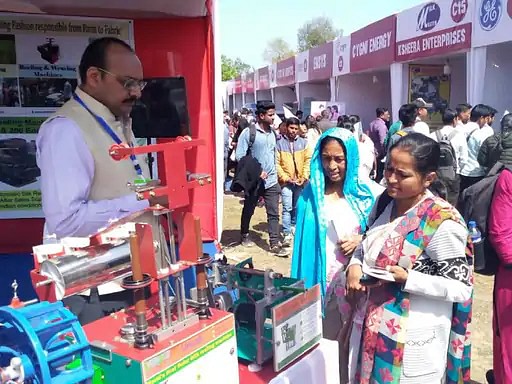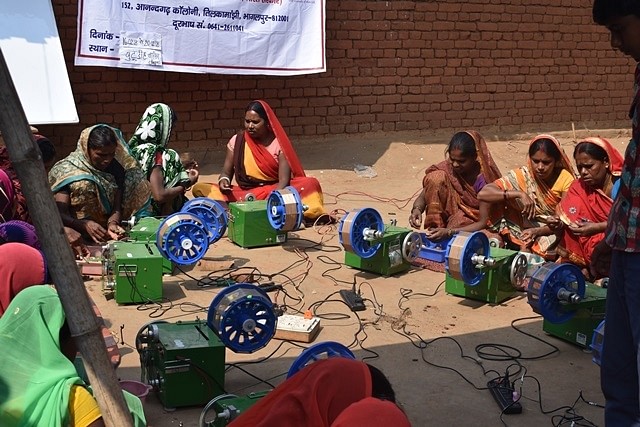In 2011, Delhi-based Kunal Vaid visited Jharkhand for a work-related project. It was here that he first realised how tedious and painful the process of producing silk can be.
“I had worked with my family textile business for over a decade. When I went to Jharkhand, I saw that women in most rural areas were manually making tussar silk threads. Their arms and feet were full of wounds — it was a sight that no one could imagine happening in today’s times,” he tells The Better India.
Silk clothing, with its royal and celebratory connotations, enjoys a prominent space in the country’s textiles market. So it’s no surprise that 9.18 million people are estimated to be employed in this sector, commercially producing varieties such as mulberry, eri and muga. However, it is the tussar silk that serves as the predominant source of livelihood for women in the country’s central and eastern regions.
Traditionally, tussar silk yarn is made through a labour-intensive process known as thigh reeling, wherein women are required to sit cross-legged for hours, draw filaments from cocoons on their thighs and then twist them with their hands. While undertaking the activity, they are prone to developing deep cuts on their limbs and intense back and joint pains, as well as long-term nerve, eye and bone disorders. What’s more, they’re only able to make about 70 grams of thread everyday, earning less than Rs 100.
It was in view of these occupational hazards that Kunal began Silk Sutra in 2015. This is an agritech startup that provides technical and marketing support to rural silk yarn producers and weavers. The company’s renewable energy-based machines reduce their physical labour and enhance productivity, thereby also helping them increase their income, he says.
“We are witnessing rapid technological development in every sector, so I, too, decided to do something to make these women more capable and boost their incomes. After a year-and-a-half, a machine could be made which could produce a lot more yarn in a day.”
Kunal is referring to a solar-powered silk-reeling and spinning machine, the first he developed, which he named ‘Unnati’.
“After installing the machines, we visited the same women and did a survey to gauge our impact. We saw how successful its functionality was at the grassroots level. Earlier, these women were earning only Rs 30 per day, but now they were making as much as Rs 250 to Rs 300 on a regular basis,” he says, adding that the women could produce up to 250 to 300 grams of thread every day.
Since Reshma Sutra’s inception, the company has also developed ‘Handy Reel’, a reeling and twisting machine; ‘Sun Kargha’, a high-efficiency loom; ‘Buniyaad’, a micro reeling machine; ‘Flexi Charkha’ a reeling and re-reeling machine, and ‘Silky Spin’, a solar/pedal spinning machine.
With these, Kunal says that more than 12,000 women now have a safer and more profitable livelihood, alongside hundreds of farmers from across 14 states including Jharkhand, Bihar, Andhra Pradesh, Chhattisgarh and Assam.

‘From thread-making to marketing’
Highlighting the significance of using renewable energy, Kunal says that most thread-makers involved with Resham Sutra hail from backward areas that often encounter electricity issues.
“We equipped the ‘Unnati’ machine with 30 watt (W) solar panels, so that women could thread for 10 to 12 hours, or even the whole day, without facing any hiccups. The machine is as big as a computer printer and can be easily installed anywhere,” he explains.
“Earlier, yarn-making machines were very large and required 300 to 400 W of power to run smoothly. But this machine requires only 10 to 15 W of power. It is easy to operate and has no dependency on the power grid,” he adds.
Kunal points out that the yarn made by Resham Sutra’s machines can be used as warp — used to make silk fabric — which is usually imported, negatively impacting the Indian silk trade business. Despite these benefits though, he says, it took some time for rural women to familiarise themselves with their machines.
“A few months after we had distributed our machines, we started receiving complaints that they weren’t working properly. It was quite worrying, and we sent our technicians to these villages. We realised that the women were operating such machines for the first time, and it was not easy for them to look after their maintenance. So, we started training local youths and assigned them the task of servicing these machines. Today, more than 60 such technicians are associated with us,” he says.
During the course of the COVID-19 pandemic, Resham Sutra also set up Rural Experience Centers (RECs) to provide training sessions in Guwahati, Assam and Jagdalpur, Chhattisgarh, he adds.
“Many women are keen on working in this field, but lack knowledge in the domain. At our centres, they are trained in all aspects of silk production, right from thread-making to marketing the finished products. We have trained more than 300 women so far and aim to connect with several more by introducing this model in other states,” he says.
One such woman is Preeti Kendakar (22), a resident of Gadhat village in Chattisgarh’s Bilaspur district. “Four years ago, a team from Resham Sutra came to our village and taught us how to operate their machines. Earlier, our earnings were not fixed, but today we have a stable income of about Rs 8,000 per month,” she says, adding that she also helps train other women.
Kunal explains, “We have observed that wherever our machines are installed, the requirements for silk production and marketing increases. That’s why we have developed a model where these women are not dependent on anyone and their work continues even after we leave.”

Making women, farmers self-reliant
Kunal says that while Resham Sutra’s primary objective was to make machines for women, his team gradually began encouraging farmers to pursue sericulture.
“We approached tribal farmers and explained to them that their income from sericulture could be a lot more than what they get by cultivating only traditional crops. Today, more than 300 farmers are associated with us,” he says, adding, “Our aim is to make both women and farmers self-reliant. So instead of buying and selling their products, we simply match them with the buyers and teach them to sell their products themselves.”
While Resham Sutra’s machines are priced between Rs 12,000 and Rs 25,000, Kunal says the startup helps arrange loans for beneficiaries who need them. “We are continually working on providing more financial options for women and are being helped by Powering Livelihood – a joint programme by the Council on Energy, Environment and Water (CEEW) and the Villgro Innovation Foundation,” he says.
For its efforts to positively impact India’s rural residents, the company has earned prestigious international honours such as the UK’s Ashden Award and the ISHOW Award by the American Society of Mechanical Engineers. It was also recognised among the ‘Top 10 Agri-Tech Startups’ by the Government of India’s National Startup Mission in 2020.
“Presently, the condition of the market is such that if a silk sari is sold for Rs 3,000 and the one who manufactures the threads receives even Rs 1,000, it is considered to be a big deal — we want to change this equation. We aim to introduce an online platform where their goods are sold in a completely transparent manner and their profits are maximised,” he says.
You can read this story in Hindi here. For further information, you can contact Resham Sutra here.
Sources:
International Journal of Latest Trends in Engineering and Technology (IJLTET).
No comments:
Post a Comment